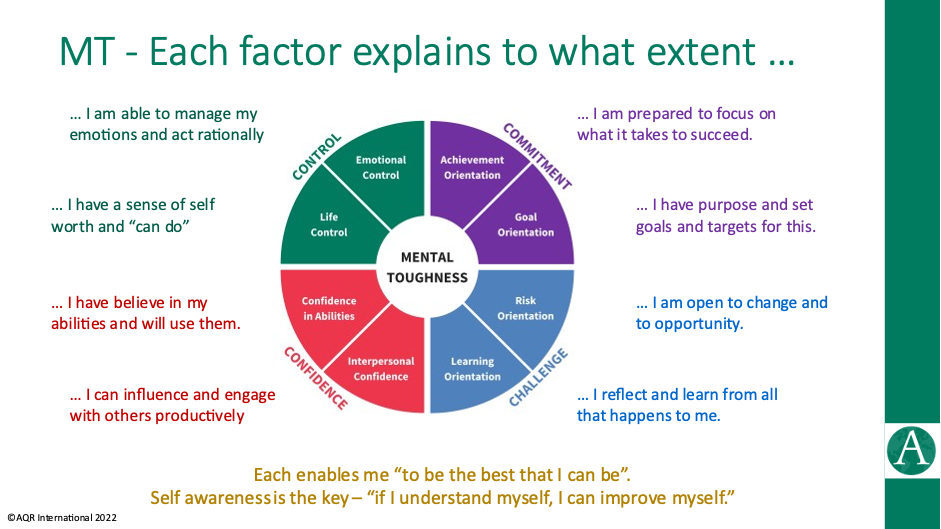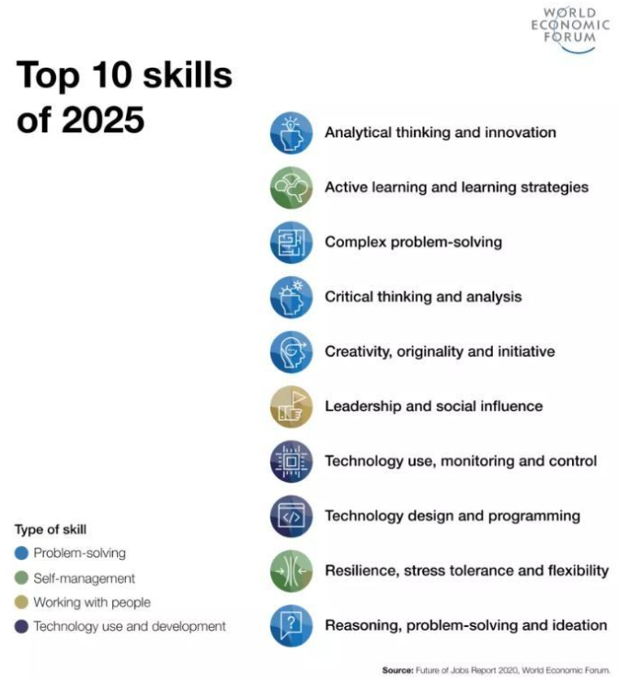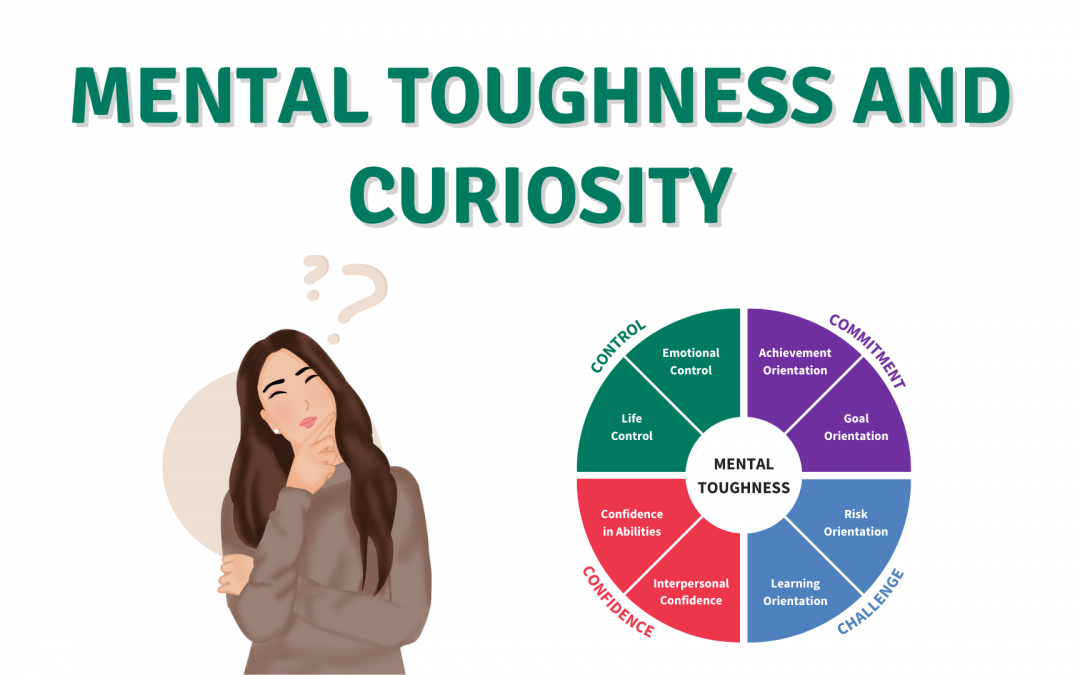Mental Toughness correlates closely with Curiosity with an interesting twist.
It could be key to developing and optimising curiosity.
Why curiosity?
In 2017, the World Economic Forum (WEF) identified Curiosity as one of 16 key skills that people will need for success in the 21st Century*. It’s a characteristic that is beginning to appear on many such lists. It has a link to Innovation and Creativity (also on that list):
The WEF defined it as “Ability and desire to ask questions and to demonstrate open-mindedness and inquisitiveness”. It’s not a surprise that it is on most employers’ agendas.
Interestingly, a 2020 list of the 10 key skills for the future from WEF ** includes, resilience, stress tolerance and flexibility – we know this as components of mental toughness.
The study
In 2023, AQR International together with Dr John Perry, Associate Professor at the University of Limerick, launched a major international study to look at cross-cultural differences in mental toughness (measured by the MTQPlus). To this was added a short scale (5 items) assessing curiosity in the respondent.
1,301 undergraduate psychology students from around the world completed the 5-item curiosity scale* and the MTQPlus questionnaire.
Dr Perry carried out an analysis of this data to explore the extent to which mental toughness might predict the variances in responses to the curiosity scale.
Realistically we do not expect to explain all the variance – there are many factors impacting curiosity. However, being able to explain a quarter or more of the overall variance is considered to be a really meaningful effect.
The results were extremely interesting.
The results – one view
The analysis showed that 30.3% of the variance in curiosity is explained by mental toughness.
This is statistically significant (F (8,1172) = 63.57, p < .001). The internal consistency of this scale was good (ω = .74).
One of the most valuable aspects of the 4Cs mental toughness concept is its 8-factor structure. This enables us to dig deeper. Here too the analysis is also interesting.
Of the mental toughness factors, the following are statistically significant predictors of curiosity (ordered largest effect first):
- Goal orientation (β = .25, p < .001)
- Risk orientation (β = .22, p < .001)
- Learning orientation (β = .15, p < .001)
- Interpersonal confidence (β = .11, p < .001)
and interestingly
- Achievement orientation (β = -.08, p = .011)
The first four are all as you would expect.
Goal Orientation embraces the idea of having a purpose, and Risk Orientation, is the idea of seeking and seeing opportunity where others may not. Learning Orientation is self-evidently relevant and Interpersonal Confidence is likely picking up that being minded to engage comfortably with others is fundamentally important for curiosity.
What is most interesting is that achievement orientation negatively predicted curiosity. It seems, on its own, that being high in achievement orientation might result in limiting curiosity.
An interpretation might be that high levels of achievement orientation represent a laser-like focus on the delivery of a task. They avoid and manage distractions. This limits curiosity.
What is useful here is that it may also confirm that understanding the factor structure of the mental toughness concept is so important.
From a practitioner perspective we know that many senior leaders get to the top of the “ladder” because they are more mentally tough than most – and very often have high levels of achievement orientation.
Might this indicate that, in a world that increasingly values curiosity, they could be agents who limit curiosity – if they are not self-aware of this possible effect?
The results – person analysis – opening new levels of understanding.
We are beginning to understand more about this. Unlike so many popular models, we are beginning to see that we need to go beyond black-and-white thinking to truly understand and explain what is happening if we are to help people and organisations develop.
As our understanding of the factors grows, especially in our understanding of how they each can connect with others, Dr Perry has been exploring this idea of person-level data profiles using cluster analysis.
The cluster analyses explore this a little further. In most samples there appear to be clusters of factors which are either more or less significant. A cluster analysis identifies common profiles within a dataset. This could be different in different samples.
One cluster was identified as relating most strongly with Curiosity. This showed above-average scores in goal orientation, risk orientation, learning orientation, interpersonal confidence and added, confidence in abilities to the above factors, but below average in life control and achievement orientation.
To cut a long story short, it shows that while Mental Toughness emerges as a positive predictor of curiosity, it is the combination of factors within a profile that matters. It appears you can actually score low (be more mentally sensitive) in life control and achievement orientation and it will not limit your curiosity (in general of course – that is the case anytime you are generalising across a sample).
What is next?
There is more to come on this. It has the potential to transform yet again the significance of the mental toughness concept and the value of the MTQPlus measure in understanding the way people respond to challenges in life and work.
We believe that the mental toughness concept is a valuable, perhaps essential, part of the toolkit for any professional working in people and organisation development. Underpinning that is a commitment to evidence-based practice and research to continue to develop this concept.
For more information about the mental toughness concept and the mental toughness measure – MTQPlus contact: headoffice@aqr.co.uk or go to https://aqrinternational.co.uk/product/mtqplus-assessment
For information about becoming a licensed user of the MTQ suite of measures contact: headoffice@aqr.co.uk
The MTQPlus measure is available in fourteen languages, accessible to more than 2/3rds of the world’s population.
Completion of the AQR Licensed user training programme is recognised by EMCC and ICF for CPD purposes.
A brief introduction to the full eight-factor 4Cs mental toughness concept is shown below:

WEF 2015 – 21st century skills

**WEF 2020 – Top 10 skills of 2025



